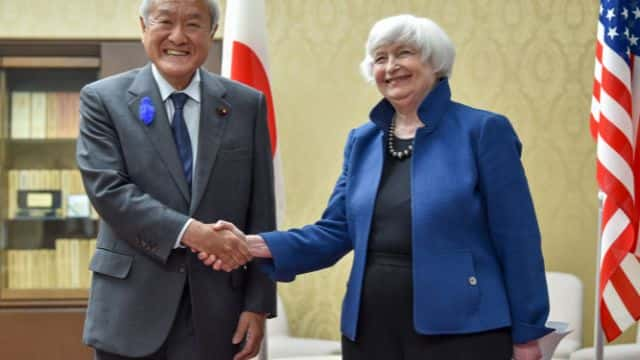The top economic officials of Japan and the United States have agreed to cooperate to address rising food and energy prices while maintaining their opposition to Russia’s conflict in Ukraine.
The battle has raised exchange rate volatility, posing concerns to economic and financial stability, according to US Treasury Secretary Janet Yellen and Japanese Finance Minister Shunichi Suzuki on Tuesday.
In a joint statement released after their discussion in Tokyo, the two parties pledged to “continue closely consulting on exchange markets and cooperating as necessary on currency matters, in keeping with our G7 and G20 commitments.”
The two leaders pledged to cooperate to help Kyiv overcome its economic difficulties and jointly denounced Russia’s “unprovoked, unjustified, and unlawful attack against Ukraine.”
Although there was no specific agreement for such a plan in the joint statement, it did say that both parties “where appropriate” welcomed efforts to pursue price controls on Russian oil. warns that the price of oil may increase globally by 40% to approximately $140 per barrel without a cap and that Moscow is prevented from using increasing oil prices to finance the conflict.

A previous statement made by a top US Treasury official on Tuesday raised the possibility that a price cap covering Russia’s marginal cost of production may encourage Moscow to keep up oil exports while depriving it of money to pay for the war.
Because of the conflict and the declining value of the yen relative to the US dollar, Japan, which is highly dependent on oil imports, has been struggling with inadequate energy supplies.
The government would “monitor the currency market even more closely while liaising with the Bank of Japan,” according to Suzuki, who earlier on Tuesday expressed alarm over the yen’s decline.
Yellen and Suzuki also pleaded with China and other creditors who are not Paris Club members to work together to reduce debt for struggling low-income countries.
Read more:-
- The Construction of Oregon’s Largest Landfill by Lake County Is Shrouded in Secrecy.
- According to the Aretha Franklin Estate, the $7.8 Million Irs Bill Has Been Paid, Opening the Possibility of Payments to the Singer’s Sons.
- The U.s. Railroad Labor Dispute Has a Deadline, and President Biden Must Act.
“We welcome G7 efforts to continue investigating ways to curb rising energy prices, including the viability of price caps where appropriate while considering mitigation mechanisms to ensure that the most vulnerable and impacted countries maintain access to energy markets,” the two leaders said in the statement.
In the meantime, Yellen paid tribute to the late former Japanese Prime Minister Shinzo Abe, who was shot dead on Friday, at a private wake on Monday night, applauding his initiatives to boost Japan’s economy and advance women’s rights.
Before departing for South Korea on July 15, Yellen will stop in Indonesia on Wednesday to see Suzuki and other G20 finance officials.
A top US Treasury official previously stated on Tuesday that a price cap covering Russia’s marginal cost of production may encourage Moscow to maintain oil exports while depriving it of funds to pay for the war.


